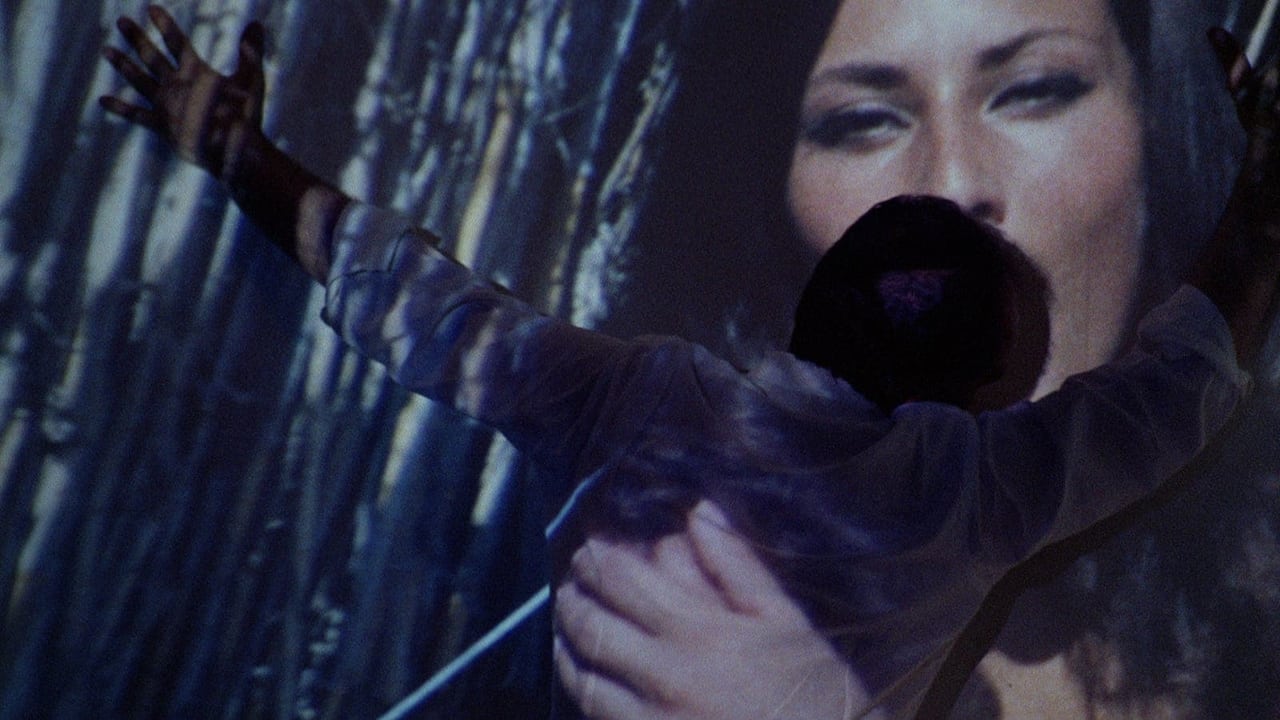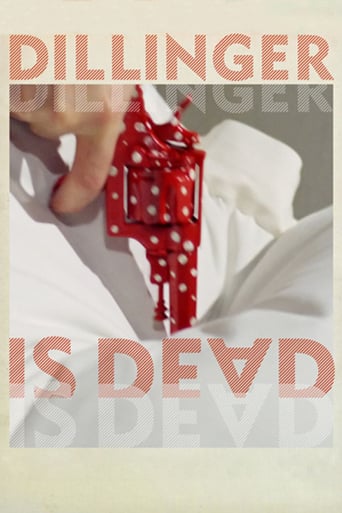



Highly Overrated But Still Good
The performances transcend the film's tropes, grounding it in characters that feel more complete than this subgenre often produces.
View MoreThis is a small, humorous movie in some ways, but it has a huge heart. What a nice experience.
View MoreWhile it doesn't offer any answers, it both thrills and makes you think.
View More"Dillinger è morto" is a bizarre Italian film by Italian director Marco Ferreri, made in 1969, and never shown in the U.S. until now, 2009, in its scattered special engagements. I had the good fortune to catch it in Rome in 1970, on my last night in the city, at the neighborhood Cinema Farnese in Campo de' Fiori.It deals pretty much with an evening in the life of a character named Glauco, played by Michel Piccoli, who comes home from work in a gas-mask factory, is disgusted with the cold supper left for him by his always sleeping wife, prepares a gourmet meal of his own as he cleans (with virgin olive oil) a revolver found in a closet and wrapped in old newspapers. The papers contains the story of the death of American gangster John Dillinger. The revolver, of uncertain origin, obsesses him. When done, he paints it red with white polka dots. This is an interesting man but hardly a sane one. And then...well, and then...what Glauco does with that revolver and how it becomes an invigorating turning point in his unwell life, gives the film a measure of its eerily fascinating allure. This lost cult movie is certainly an interesting counterpoint to Johnny Depp's current "Public Enemies," about the gangster himself.I never thought I would see it again, since it has never been available on video or DVD. Yesterday I caught it at the Brattle in Cambridge. You may like it; you may not. But, as with me four decades later, it will never leave your mind.
View MoreDillinger is Dead (Dillinger e Morto) is a Marco Ferreri film. I just saw the film in a very good print at the Museum of Modern Art in New York, and this is a film that benefits from being seen in a cinema where there are less distractions, and a film of this pace and sensibility has a better chance of seizing you and bringing you into its unique and power logic. The film, in my estimation, is a meditation on alienation in a period of increasing mass media saturation. The film artfully weaves in a multitude of media moments, including television, home movies, radio, records, newsreels, and newspapers. At a certain point in watching the film, I deeply appreciated how Ferreri forces us to consider not only his character's relationship to media, but our own relationship to media. In his most expressive audio-visual moments, this film moves away from any standard narrative formula into a subjective exploration of the power of cinema and its affect on our psyche and our actions. At those moments, the film is visually mesmerizing, sonically engaging and psychologically intimate. One scene of a projected home movie on the wall of his living room is one of the best sequences of its sort that I have ever seen. This film opens with Glauco (Michel Piccoli) at his job, testing gas masks. The conversation between Glauco and one of his co-workers that opens the film highlights the theme of alienation, and the film right from the beginning establishes a tone that engages the fate of man in a society of the spectacle. The film then takes place over one night in the life of Glauco. We watch as he comes home and spurns a dinner that is waiting for him. He goes upstairs to his bedroom, where he has a brief, though telling, encounter with his wife, played by Anita Pallenberg. The bedroom scene begins to establish the basic strategy of Ferreri's film. There is very little dialog between Glauco and his wife (In fact, there is very little dialog in the film at all, it verges on being an almost non-dialog driven film). Instead, we, in the audience, bare witness to their interaction, and our feelings of what we are seeing are impacted by source music emanating from a radio that Glauco's wife is listening to (Most, thought not all, of the music used in the film is produced by known sources seen in the film). The music in the scene is mostly contemporary Italian pop music and American pop music. The songs lend an interesting narrative counterpoint to this scene (and is true in other scenes as well), as the music is usually expressive of the unspoken feelings and emotions between Glauco and his wife. When Glauco goes back downstairs, he begins to prepare his own meal, which actually turns out to be quite a production. When Glauco goes searching for a particular spice, he accidentally knocks down a stack of old magazines in the spice closet, and a mysterious package, wrapped in newspaper, spills onto the floor. In one of Ferreri's most deft storytelling touches, the content of that package and Glauco's reaction to it, becomes a structuring element for this film. But it is clear that Ferreri's passion here is not some genre formula film, rather the film is an essayistic exploration of alienation, told through a seemingly simple night in the life of Glauco. The performances in this film are uniformly excellent, beginning with Piccoli's lead performance that carries the film. Pallenberg isn't given much screen time, but she does a good job in a limited part. But Glauco's maid, played by Annie Girardot, has a couple of great scenes that add a juicy spark to this tale. In fact, while the film does move in its own way towards a conclusion, I found a short moment when Glauco stops in front of a poster celebrating Italian Futurists to be very telling of Ferreri's intentions. The Futurists were obsessed with speed, and modernity, and cinema, and their manifestos would hold much appeal for a character such as Glauco. But it is clear in Dillinger is Dead how much has changed since the 1930s when modernity seemed to hold unchecked promises. By the end of the 1960s, that type of Utopian celebration of modernity was no longer as easy to summon. The society of the spectacle was beginning to encroach on all aspects of everyday life, and in a character like Glauco, in the depths of his alienation, we see that the line between fantasy and reality in our culture was already well on its way to eroding by the end of the 1960s.
View MoreFirst i have to say, I didn't like this movie. Too "sixties" for me. During this years of fear, confusion ans sex liberation there were tons of experimental movies. This is one of them. So, if you like solid scripts and action, get way from this film.This film is an experience like a David Lynch movie, very hypnotic and seducing if you are caught in it.It's also a sequel - or a reply - to Jean-Luc Godard's "Le Mepris". First, there's Piccoli (sometimes he's dressed the same as in "Le Mepris") and there are many scenes who work as an echo of Godard's movie (the arguing scene, the jump in the sea...) Like a french critic said "Dillinger" is like "Le Mepris" with Brigitte Bardot on the first floor sleeping.So, not a film as experimental and "destroy" as it seemed at first look. Unusual for sure but worth a look.
View MoreThis movie follows Glauco, an insomniac who entertains himself at night with the small things in life, a newspaper, his dinner, or even his reflection. As the viewer follows his actions it is so slow, and so drawn out, that we actually begin to feel his boredom, and find entertainment in the details of the movie, much as he does in his life. If you're more of a fan of Bruckheimer than Visconti you will not find this movie entertaining enough, but paying close attention to the shots, scenes, and characters you will find this movie intensely interesting. It is through the feelings in the film, the closed in, slow and meaningless life he leads at home, we start to understand and appreciate the way he finds joy. (POSSIBLE SPOILER) Until his meandering ways lead him to the ultimate form of immediate entertainment, immediate and indefinite. It is a window into a new life, which we have to believe he will also grow tired of. And it finishes in the same odd fashion, our strange character riding off into the sunset.
View More